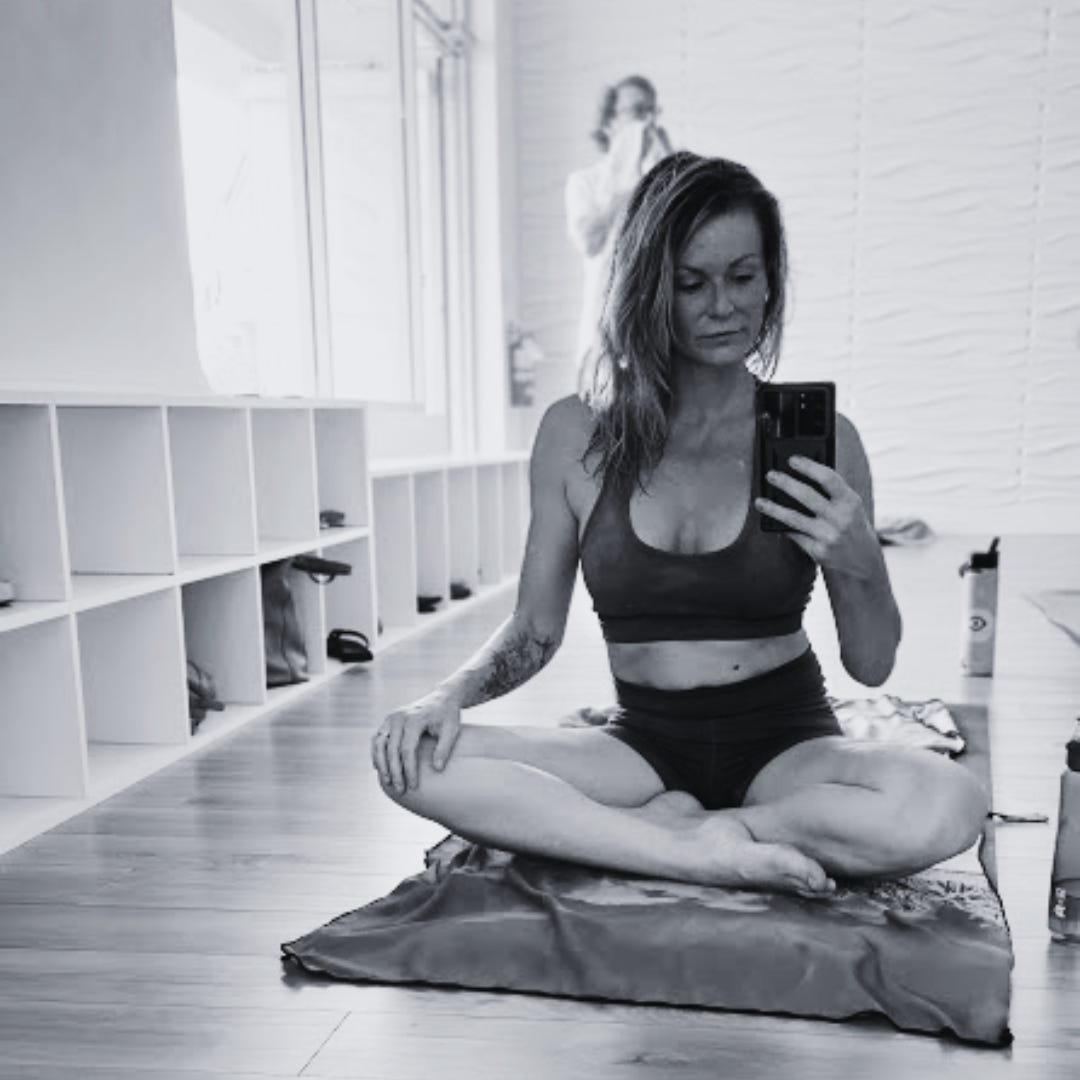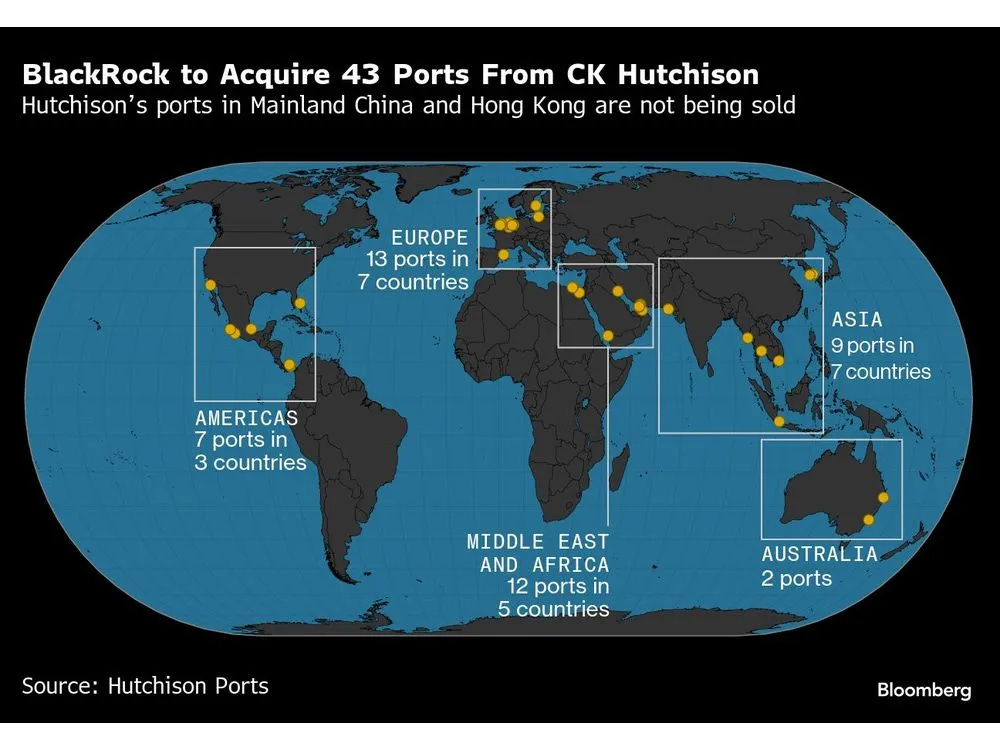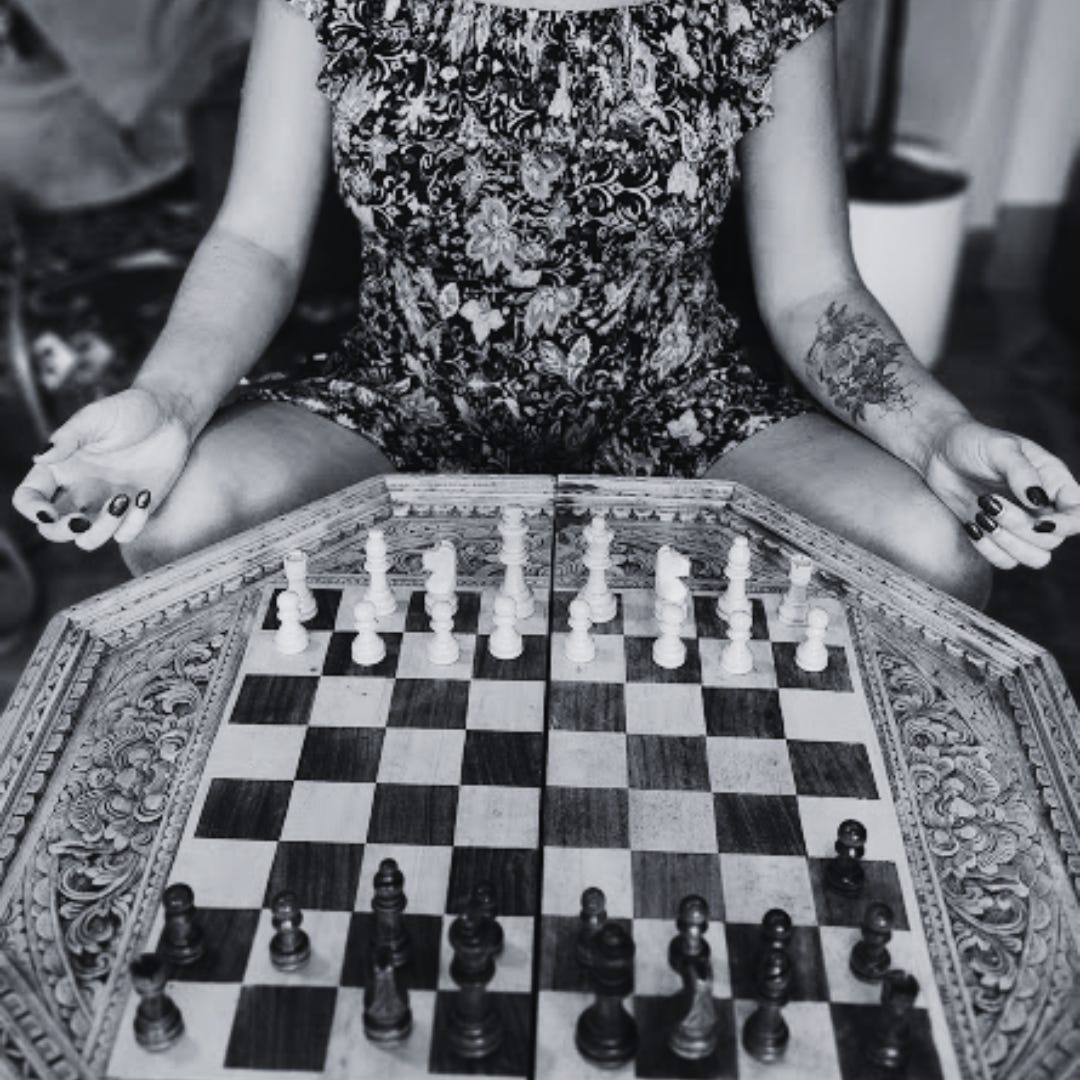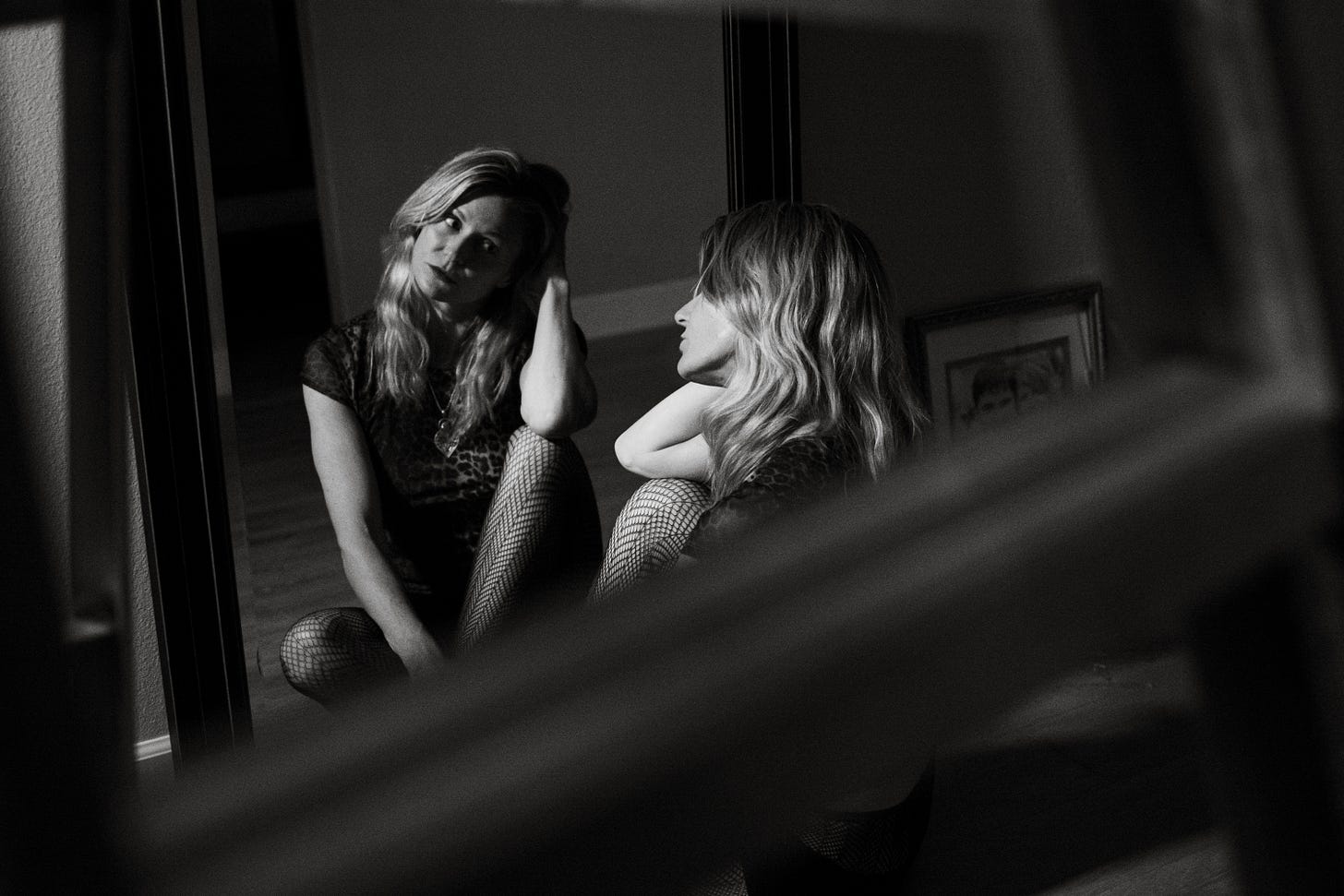How the Fuck Did We Ignore the Taste of Global Crisis?
When our farmers markets collide with war zones, and caring isn't enough to bridge the gap.
My best friend pulled me through the Santa Cruz farmers market, her fingers wrapped around my wrist with the kind of urgency that made my pulse quicken. It wasn't danger she was leading me toward—just food. But that distinction—between urgency born of desire versus desperation—is exactly the privilege I can't stop thinking about.
"You have to try this," she insisted, navigating us toward a booth where a line had already formed. "This woman's food... I don't even know how to explain it. It's like your grandma cooked it. It tastes like love."
The aroma hit me before we even reached the counter—warm spices, garlic, something smoky and earthen that seemed to carry stories across oceans. I glanced up at the simple sign above the booth.
Eritrean Cuisine.
I felt that familiar tightness in my chest—the one that comes when worlds collide. "Do you know what's happening in Eritrea right now?" I asked her.
She scrunched her nose, a little embarrassed. "No. What's going on?"
And there it was. That moment when the privilege of our afternoon market ritual brushed against the brutal reality of a world we barely understand—a world where people are fighting for survival while we debate which local honey to buy.
I didn't blame her. It was only the night before that I'd walked into our living room and found my husband on the couch, his face lit blue by the screen as he watched a Warfronts report.
(If you've never heard of it, Warfronts is one of the few independent journalism platforms still doing what legacy media won't: connecting the dots. Naming names. Showing how conflict doesn't just erupt—it's orchestrated. Watch the episode referenced in this article here.)
I sat down in front of him for a shoulder rub, curious how a country I could barely place on a map was suddenly being called the center of the next global war.
That was the first time I consciously heard about Eritrea. A small nation tucked along the northeastern edge of Africa, hugging the Red Sea. It borders Sudan, Ethiopia, and Djibouti, and sits directly across from Saudi Arabia and Yemen—smack in the middle of one of the most strategic maritime trade routes in the world. A literal geopolitical pressure point.
As military veterans, my husband and I have deployed near these waters, flown over these countries, tracked these coordinates on command and control screens. And still, Eritrea—so repressed, so closed off—barely flickers in the awareness of the average American. It hadn't even flickered in mine until the night before.
As we waited for our orders, I tried to give my friend a quick explanation about Eritrea—about how this tiny nation has become a geopolitical chess piece, trapped between regional powers fighting for control of the Red Sea shipping lanes. I told her about the authoritarian regime that has forced nearly half a million refugees to flee, about the indefinite military conscription that amounts to forced labor, about how this country most Americans can't find on a map might become the flashpoint for the next major conflict.
Our food came out hot and fast, my best friend looking visibly relieved for the interruption—her eyes carrying that distinctive overwhelm that comes when someone realizes they didn't know what they didn't know. We carried our plates to a nearby table, and I took my first bite. Lentils stewed in berbere. Roasted cauliflower. Charred chicken thighs slick with spice and smoke.
I could taste the love she had described. But I could also taste something else.
Maybe it was survival. Maybe it was grief. Maybe it was heartbreak, served warm on a compostable plate.
When Awareness Becomes Overwhelm
After we wiped our lips and cursed how good the food was, my best friend said what so many of us carry but rarely say out loud.
"I feel like I should know more. I mean, I want to care. I do care. But there's just so much going on in the world all the time—I don't even know where to start. And honestly, I think I'm scared of caring wrong."
That sentence settled between us heavier than the lentils on our plates. And I knew she wasn't alone. I knew because I've said it, too.
I felt that statement in my body—a tightness across my shoulders, a heaviness in my stomach. Because isn't that exactly the trap? We're terrified of getting it wrong, so we do nothing at all. We retreat to the safety of not knowing, while still believing we're the kind of people who would act if only we knew how.
This is the heartbreak of our generation. We were raised on Girl Power and "educate yourself" infographics. We grew up on the internet, studied gender theory in college, read The Body Keeps the Score (a must read if you haven’t), bought into kombucha and EMDR. We joined anti-racism protest marches, and we did shadow work at spiritual retreats. We tried to care enough to fix something. Everything. Anything.
And still—we're here.
Burnt out. Overstimulated. Frozen.
Buying organic tomatoes at the farmers market while the world burns in headlines we no longer have the capacity to follow. Feeding our families nourishing meals while somewhere else, someone just like us is boiling rice with a bucket of water from a refugee camp tap. Talking about raising kind kids while forgetting that kindness without context is a privilege.
We are not here because we don't care. We are here because we confused awareness with action. We confused being informed with being awake. And somewhere along the way, the bandwidth to hold all that grief simply… broke.
There's a unique kind of sorrow that comes from realizing you were supposed to be one of the "good ones," and you're not even sure what that means anymore. That maybe your good intentions don't matter as much as you thought they did. That your knowledge is fragmented. That your influence is foggy. That your place in all of it feels slippery and insubstantial.
But I believe now, standing at the edge of that realization: that grief isn't failure.
It's proof you're still alive.
It's okay to be tired. It's okay to feel shame. But those feelings are not the end. They're the threshold.
The trailhead.
Because what happens if you keep going? What happens if you let your curiosity outpace your overwhelm? What happens if you stop asking how the world feels and start asking how it actually works?
The Choreography of Chaos
This is where most people freeze. Because when information floods the system without grounding, it stops feeling like knowledge. It starts feeling like noise. And in the body, noise registers as chaos. And chaos? Chaos breeds shame. So we scroll. We dissociate. We check out. Because somewhere deep down, we’re afraid that knowing more might be the thing that finally breaks us.
But what if it’s the opposite?
What if it's the very thing that cracks us open in the right places? What if that plate of food isn't just lunch, but a dispatch? A quiet message carried through borders, battles, and supply chains before it lands on your table? The flavors telling stories our news feeds never show us, the spices preserving histories our textbooks never taught us?
Because that's exactly what it is.
That berbere-spiced stew connects directly to Ethiopia and Eritrea—once aligned in a brutal campaign against Tigray—now turning on each other. Prime Minister Abiy Ahmed calls Ethiopia’s loss of Red Sea access “a historical mistake,” floating claims for sea routes that have triggered military mobilizations. Eritrea has responded with a national call-up. Ethiopia has quietly moved tanks toward Afar. What began as a failed peace deal has become a powder keg—this time, with energy corridors and coastal control in the balance.

It’s Sudan—home to the world’s worst humanitarian crisis, where over 14 million people have been displaced. Where both the Sudanese Army and the RSF are accused of genocide, and starvation has been weaponized. Beneath the ruins of Khartoum, foreign powers circle like vultures—drawn by gold, oil, and strategic access to the Nile and Red Sea.
It’s South Sudan, where a ruptured pipeline—damaged during Sudan’s civil war—threatens to collapse a fragile economy reliant on oil for 90% of its revenue. As local militias rearm and poverty deepens, the UAE quietly leverages economic lifelines for political influence.
It’s Somalia, a fractured nation in name only, where ports like Berbera and Bosaso are pawns in the hands of foreign states. The U.S., UAE, Turkey, and Russia aren’t just watching—they’re bidding. Mogadishu, desperate, sends lobbying letters to Washington offering military access to infrastructure it doesn’t even control. That’s not sovereignty. That’s survival dressed up in statecraft.
And while Americans debate Gaza and Ukraine, China has moved its pieces. In Ethiopia and beyond, it's not just about ports or pipelines—it’s cobalt, lithium, copper. According to AidData, China has invested $57 billion in mining projects across 19 developing nations, striking deals that exchange minerals for control. Railroads for rare earths. Roads for sovereignty. This isn’t generosity. It’s grand strategy. And it’s working.
Meanwhile, Europe pushes forward its Green Deal. Ukraine was once meant to be the cornerstone—Europe’s renewable engine. But it’s $500 million in debt to its own green producers. Much of its infrastructure is either bombed out, occupied, or abandoned. As investment dries up, European eyes turn to Africa: rich in lithium and copper, poor in bargaining power. Green dreams, brown hands, and blacked-out communities.
And as Africa becomes the stage, the Gulf steps into the spotlight. Saudi Arabia and the UAE have acquired strategic ports along the Red Sea—Masawa, Assab, Bosaso. Civilian infrastructure turned military staging grounds. Oil and weapons flow in. Refugees and bodies flow out.
Russia, too, is on the move—repositioning arms from Syria to Libya under the cover of political collapse. From there, weapons are funneled into the Sahel, fueling insurgencies in Mali, Burkina Faso, and Niger. Wagner-linked logistics, Kremlin-backed deals—violence you’ll never see on your feed, but that’s shaping the next decade of global conflict.
And just as all this unfolds, the U.S. is… stepping back. Dismantling AFRICOM—the only command center focused solely on Africa—despite warnings that doing so will create a strategic vacuum for China and Russia to fill.
Into that vacuum steps BlackRock.
Through a $23 billion deal, the world's largest asset manager now controls 43 ports across 23 countries (many locations not even publicly disclosed)—including the Panama Canal’s most critical terminals. That’s not just shipping. That’s your fuel. Your medication. Your groceries. Infrastructures essential to everyday life, now held by a globally operated financial behemoth. The Trump administration calls it reclaiming American power. But whose power? And at what cost?
So look again.
What appears as chaos—civil wars, coups, insurgencies, starvation, migration—it’s not random.
And once you really see it, you can’t unsee it.
Because this isn’t chaos. It’s choreography.
Africa isn't a square on the board. It is the board. The keystone. The terrain on which the great powers redraw the maps while pretending the game isn't rigged.
Because whoever controls the Red Sea controls the Suez Canal. Whoever controls the Suez Canal controls global trade. Whoever controls trade controls supply chains. And whoever controls supply chains controls power.
This is why Gaza, Ukraine, and the Horn of Africa aren't separate stories. They're layered fronts in the same global war. A resource war dressed up as diplomacy. A tech war disguised as counterterrorism. A climate war masked as humanitarian aid. A power war—camouflaged by every narrative except the truth.
Comfort as Complicity
The machine works like this:
The U.S. outsources its wars and privatizes its presence, turning military occupation into corporate contracts while denying responsibility for the bodies left behind. Russia seeds chaos and feeds on it, treating human suffering as fertilizer for power. China pours concrete and debt in equal measure, building roads that all lead back to Beijing. Gulf monarchies purchase shorelines with blood money, their royal fingerprints nowhere near the trigger. Europe fortifies its borders with barbed wire and bureaucracy, then gasps in manufactured horror at the drownings their policies ensured.
Each player has a role. Each mask has a purpose.
And the people—Eritrean, Sudanese, Gazan, Ukrainian—they are not the players.
They are the pieces.
The terrain.
The collateral damage in a game they never asked to join.
Meanwhile, we—the comfortable spectators—perform our assigned parts. We hashtag our outrage on phones built from minerals extracted from the same lands being bombed. We vote for candidates who promise peace while funding weapons. We share fundraisers and feel the warm rush of virtue as we tap "donate," then scroll to the next distraction.
But who counts our inputs as profit?
Who translates our fleeting attention into shareholder value?
Who collects the data on which crisis makes us click, which atrocity makes us pause, which suffering sells the most moisturizer in the ads that follow?
If we can't name the players—the actual decision-makers moving pieces across continents—we're not witnesses to history. We're just consumers of its sanitized storylines.
And we'll keep losing. Not just elections or policy battles. But our capacity to recognize the board itself.
Let's be brutally honest.
My best friend and I? We get to look away.
We're white. We're safe. We live in a beach town where the biggest crisis is whether the farmer's market is out of goat's cheese. We compost. We light incense. We talk about being "in integrity" while someone else holds the weight of the world on their back.
That doesn't make us bad.
It just makes us well-insulated.
And someone built that insulation for us. Someone designed our comfort. Someone engineered our distance. Someone profited from our ability to choose when to care and when to turn away.
Because in a world built on extraction—of labor, land, bodies, stories—comfort is its own kind of complicity. The privilege of saying "I can't take it anymore" when the headlines feel overwhelming, when the world seems too big to understand, only exists because someone else is taking that burden on for you.
Their backs break so yours doesn't have to bend.
The woman at the booth, stirring lentils on a burner in a country she didn't grow up in?
She can't turn away from what she knows as her truth; her lived experience that she cooks into her food. Her body carries memories her tongue might never speak. Her hands remember countries her children might never see.
And somehow—between cumin and ginger and grief—she spooned that life onto a plate and fed it to two women who didn't know what they didn't know.
From Frozen to Fired Up
We finished our meal in a different kind of silence than we'd started with. The flavors lingered—complex, layered with history I couldn't fully comprehend. My friend wiped her plate with the last piece of injera, looked up at me with eyes that had shifted somehow, and said, "I'll never taste this the same way again, will I?"
And that's the point. Once you see it, you can't unsee it. Once you taste it—the bitterness beneath the spice, the weight behind the warmth—you can't untaste it.
The question isn't whether we deserve our farmers markets and peaceful lunches. The question is what we do with the knowledge that others don't have them. How we move from the paralysis of overwhelm to the clarity of action.
Because if all we do is stand at the edge of grief, we're still just spectators to someone else's suffering. But if we let that grief crack us open—make us curious, make us question, make us connect dots instead of just collecting facts—maybe that's how transformation begins.
Not with a hashtag. Not with performative awareness. But with the simple, human acknowledgment that the same hands that feed us might be the ones that need us to finally wake up and ask:
How the fuck did we get here? And more importantly: Where do we go next?
About the Author
I’m Alisa Sieber—a writer, veteran, and relentless question-asker, exposing the patterns of power, control, and resistance that shape our world. My work blends personal reckoning with systemic critique, challenging the narratives we’ve been told and demanding we ask harder questions.
Share How the Fuck Did We Get Here?
How the Fuck Did We Get Here? is a deep dive into the systems failing us, the leaders gaslighting us, and the patterns of control we can’t afford to ignore. If this article resonated with you, share it with someone who needs to see the bigger picture.
Subscribe to How the Fuck Did We Get Here?
A new How the Fuck Did We Get Here? is published every Monday at 9 AM PST. Subscribe to stay informed, stay questioning, and never look away.
Also Read: How the Fuck Did I Get Here?
If you’re interested in personal storytelling, breaking generational cycles, and reckoning with trauma, identity, and resilience, check out my other series, How the Fuck Did I Get Here?.
This series explores the deeply personal side of survival and transformation—where I ask not just how the world got here, but how I did.
A new HTFDIGH essay drops every Friday at 9 AM PST.
👉 Read How the Fuck Did I Get Here?
🔗 Connect with Me
📲 Instagram: @alisa.sieber
🌍 Bluesky: @alisasieber.bsky.social
💬 Leave a comment below—I’d love to hear your thoughts.















